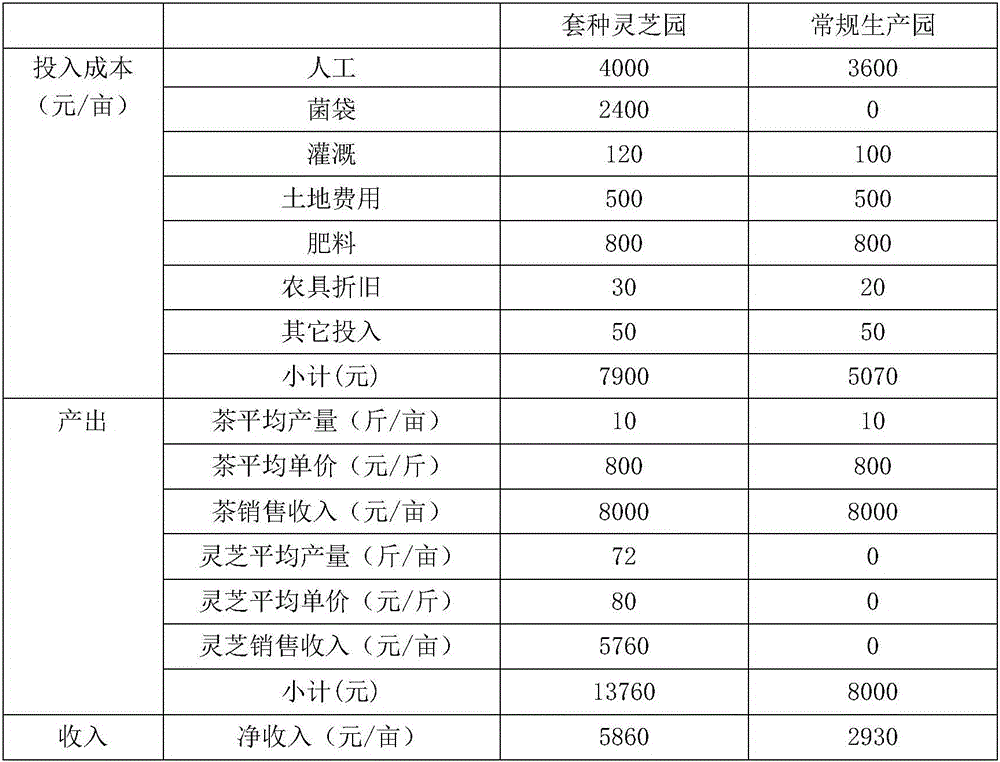Soil-covered cultivation method of interplanting lucid ganoderma in tea garden
A cultivation method and tea garden technology, applied in the field of soil-covered cultivation of ganoderma interplanted in tea gardens, can solve the problems of insufficiently systematic cultivation management methods, high construction costs, and lack of active ingredients in fruiting bodies of biotransformation rate, etc., to achieve increased land utilization, biological The effect of high conversion rate and excellent fruiting body quality
- Summary
- Abstract
- Description
- Claims
- Application Information
AI Technical Summary
Problems solved by technology
Method used
Image
Examples
Embodiment 1
[0029] A soil-covering cultivation method for interplanting Ganoderma lucidum in a tea garden. The cultivation season is selected to start bag making at the end of April, and begin to produce the lucidum from the bag at the end of May. The lucidum production period is 50-60 days, and specifically includes the following steps:
[0030] (1) Preparation of Ganoderma lucidum strains: As the interplanting of Ganoderma lucidum in tea gardens is affected by the natural climate, it is difficult to collect spore powder, so choose a variety with large and thick slices to facilitate high and stable yields:
[0031] A) Prepare the cultivation material according to the following mass calculation: 62.5% of cottonseed hulls, 30% of bran or rice bran, 5% of corn flour, 0.5% of potassium dihydrogen phosphate, 1% of gypsum powder, and 1% of lime, and adjust the water content to 60%. -65%;
[0032] B) Mixing material: according to the proportion of step A), accurately weigh each nutrient compone...
Embodiment 2
[0043] A soil-covering cultivation method for interplanting Ganoderma lucidum in a tea garden. The cultivation season is selected to start bag making at the end of April, and begin to produce the lucidum from the bag at the end of May. The lucidum production period is 50-60 days, and specifically includes the following steps:
[0044] (1) Preparation of Ganoderma lucidum strains: As the interplanting of Ganoderma lucidum in tea gardens is affected by the natural climate, it is difficult to collect spore powder, so choose a variety with large and thick slices to facilitate high and stable yields:
[0045] A) Prepare the cultivation materials according to the following mass calculations: 34.5% of sawdust, 35% of cottonseed hulls, 18% of bran or rice bran, 10% of corn flour, 0.5% of potassium dihydrogen phosphate, 1% of gypsum powder, and 1% of lime. Water volume to 60%-65%;
[0046] B) Mixing material: according to the proportion of step A), accurately weigh each nutrient compon...
Embodiment 3
[0057] A soil-covering cultivation method for interplanting Ganoderma lucidum in a tea garden. The cultivation season is selected to start bag making at the end of April, and begin to produce the lucidum from the bag at the end of May. The lucidum production period is 50-60 days, and specifically includes the following steps:
[0058] (1) Preparation of Ganoderma lucidum strains: As the interplanting of Ganoderma lucidum in tea gardens is affected by the natural climate, it is difficult to collect spore powder, so choose a variety with large and thick slices to facilitate high and stable yields:
[0059] A) Prepare the cultivation material according to the following mass calculation: 40% corn cob, 35% sawdust, 22% corn flour, 1% superphosphate, 1% gypsum powder, 1% lime, and adjust the water content to 60%-65%;
[0060] B) Mixing material: according to the proportion of step A), accurately weigh each nutrient component in the order of weighing the main material first and then o...
PUM
 Login to View More
Login to View More Abstract
Description
Claims
Application Information
 Login to View More
Login to View More - R&D
- Intellectual Property
- Life Sciences
- Materials
- Tech Scout
- Unparalleled Data Quality
- Higher Quality Content
- 60% Fewer Hallucinations
Browse by: Latest US Patents, China's latest patents, Technical Efficacy Thesaurus, Application Domain, Technology Topic, Popular Technical Reports.
© 2025 PatSnap. All rights reserved.Legal|Privacy policy|Modern Slavery Act Transparency Statement|Sitemap|About US| Contact US: help@patsnap.com


